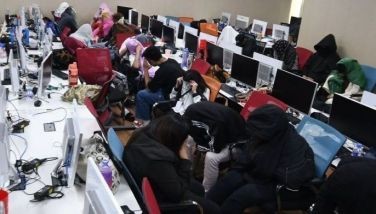Beijing: Air safe for Games
BEIJING – The air quality in this Chinese capital will not pose a problem to athletes during the Olympic Games in August, Chinese authorities say.
Latest tests conducted on the air around Beijing showed satisfying results and health issues related to air are not expected to be a concern for athletes or spectators.
Exactly four months before the start of the Beijing 2008 Olympic Games, delegations from 205 National Olympic Committees (NOCs) learned on Tuesday about the International Olympic Committee’s (IOC) latest appraisal of the air quality on the occasion of the XVI General Assembly of the Association of National Olympic Committees currently taking place here.
IOC Medical Director Patrick Schamasch explained the results of an analysis of a set of data that were taken during last summer’s test events.
The data included temperature, wind, humidity and SO2, NO2, CO, Ozone and PM10 readings, which were taken by the Beijing Environment Protection Bureau from August 8 to 29, 2007.
The IOC Medical Commission evaluated the data on the basis of the World Health Organization 2005 interim target standards.
“The findings indicate that, at Games time one year out, the health of athletes was largely not impaired. This finding is upheld by the fact that no health issues related to air quality were reported to the IOC by any of the team physicians who looked after athletes competing during the August 2007 test events. Nor were any such problems reported at the IAAF Junior World Championships that were held in August 2006,” Schamasch said.
Measures are continuously being taken by the Chinese authorities to improve the air quality further as compared to 2006 and 2007.
But the IOC Medical Commission’s findings indicated that there may be some risk for outdoor endurance events that include minimum one-hour continuous physical efforts at high level, such as urban road cycling, mountain biking, marathon, marathon swimming, triathlon and road walk.
“The IOC will, therefore, be working together with the relevant International Federations in order to put in place procedures which will allow a ‘plan B’ to be activated for such events if necessary.”
The procedure will include daily monitoring of air quality and weather conditions at the venues, a reporting process from the Beijing Environmental Protection Bureau to the IOC and relevant sports federations, and a joint IOC-sports federation decision to postpone the event if necessary.
The IOC assured that the health and safety of the competing athletes are of utmost importance.
Politics in Olympics
Meanwhile, the protests and disruptions of the Olympic torch passage are aimed at persuading the Chinese government to give Tibet more freedom, according to Yan Wenbin, director of Xinhua News Agency’s International Department.
“Some people will make problems because they’re unhappy with what’s happening. They’ll use the Olympic games to persuade China to give them more freedom,” Yan said.
He said that the state-run Xinhua will report and provide the world with the truth even as unfavorable developments happen.
“We’ll provide the world the truth. That’s what Xinhua can do,” he added.
China has urged political figures “to respect the spirit and principles of the Olympic Games, adopt a responsible attitude toward the Games and the torch relay, and not do anything that is against the people’s aspirations.”
The Association of National Olympic Committees (ANOC) dismissed any call for a boycott of the Beijing Olympics and the opening ceremony because of the riots in Tibet, saying the call is an error.
“We definitely say ‘no’ to any boycott and ‘yes’ to the Olympic Games,” said ANOC president Mario Vazquez Rana.
The ANOC 16th general assembly opened here on Monday.
Vazquez Rana emphasized that the Olympics should be held without any political interference.
“I hope very much that political associations or governments do not use the Olympic Games as a pretext to launch a boycott or try to obtain any benefit out of it,” he said. “It is very clear that we follow one single idea, one single philosophy: To hold the Games for the benefit of our young athletes. That’s why I believe not only the Games in Beijing, but all Olympic Games, must be free of any political interference.”
The ANOC president noted that athletes have freedom of expression but the Olympic Charter should guide their statements.
“An athlete who steps outside the rules of the Olympic Charter is committing a mistake, which she or he knows not to do,” he said.
The Olympic Charter, drafted by the International Olympic Committee (IOC), outlaws political acts and provides that “No kind of demonstration or political, religious or racial propaganda is permitted at any Olympic site, venue or other area.”
- Latest
- Trending





























